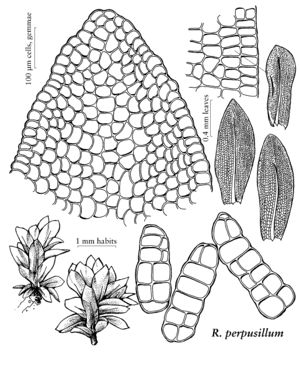Rhachitheciaceae
Plants small, erect, gregarious. Stems with [or without] central strand. Leaves spathulate, [ovate, oblong, lingulate,] erect spreading when moist, crisped when dry, acute, 1-costate, costa vanishing before apex [minutely excurrent]; laminal cells smooth [papillose], thin-walled, rectangular in proximal half, shortrectangular to isodiametric distally; alar cells not differentiated. Specialized asexual reproduction present [or absent] as multicellular gemmae, 1-seriate to 2-seriate, to 7 cells in length, borne on surface of leaves. Sexual condition autoicous; perichaetial leaves differentiated [or not]. [Sporophytes solitary in perichaetia. Seta erect, straight or twisted when dry, curved when moist. Capsule immersed to exserted, ribbed, rarely smooth; annulus differentiated or not; endostome teeth fused or not; inner peristomial layer of only 8 or 16 cells, or endostome absent. Calyptra cucullate, smooth or papillose, glabrous. Spores striate, pitted or papillose].
Distribution
North America, Mexico, Central America, South America, Europe, Asia, Indian Ocean Islands, primarily in tropical and subtropical regions
Discussion
Genera 7, species 16 (1 in the flora).
Four fossil species of Rhachitheciaceae have been reported from Europe.
Rhachitheciaceae also includes the genera Hypnodontopsis Z. Iwatsuki & Noguchi, Jonesiobryum B. H. Allen & Pursell, Rhachitheciopsis P. de la Varde, Tisserantiella P. de la Varde, Uleastrum W. R. Buck, and Zanderia Goffinet. Previously considered allied to the Orthotrichaceae, and including genera formerly assigned to that family or the Pottiaceae, the Rhachitheciaceae have recently been transferred to the Dicranales (B. Goffinet 1997).
